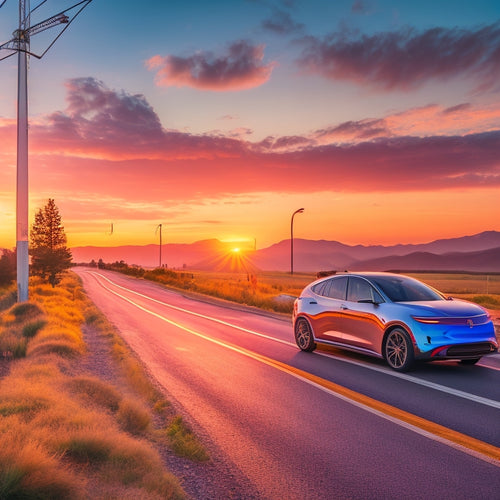
What Are the Best RV Battery Charging Systems?
Share
When selecting the best RV battery charging system for your needs, you'll want to take into account factors like power demands, budget, and personal preferences. You'll need to choose from converter, on-board, and multi-stage chargers, and explore solar power for eco-friendly recharging. Deep cycle battery charging methods and monitoring for peak performance are also essential. Look for top brands like Renogy, Magnum Energy, and Xantrex, and evaluate key features like efficiency, reliability, and advanced charging capabilities. As you explore your options, you'll uncover the perfect system to power your adventures - and optimizing your setup is just around the corner.
Key Takeaways
• Consider the power demands of your RV and calculate the required battery capacity to ensure optimal performance and longevity.
• Look for charging systems with advanced features like multi-stage charging, MPPT charge controllers, and smart charging algorithms for maximum efficiency.
• Renogy, Magnum Energy, and Xantrex are top brands known for their reliable and efficient RV battery charging systems with key features like high efficiency and advanced charging capabilities.
• Solar power is an eco-friendly option for recharging, and high-efficiency panels with monitoring systems can provide peak performance and boondocking freedom.
• When selecting a charging system, prioritize efficiency, reliability, compatibility, and advanced charging capabilities to ensure optimal performance and battery health.
Understanding RV Battery Charging Needs
Understanding your RV power demands is essential to selecting the right battery charging system. You need to take into account the total amp-hour capacity required to support your appliances, lights, and other electrical components. This includes the power needed to run your fridge, air conditioner, and other essential systems.
To determine your RV's power demands, calculate the total wattage of all your appliances and devices. You'll also need to factor in the duration of use and the frequency of recharging. This will help you determine the required battery capacity to make sure your RV remains operational throughout your trip.
For instance, if you have a 200Ah battery, you'll need a charging system that can replenish it within a reasonable timeframe.
Adequate battery capacity is vital to maintaining your RV's electrical system. Insufficient capacity can lead to battery draining, resulting in reduced performance and even complete shutdown.
Types of RV Battery Charging Systems
As you explore the world of RV battery charging systems, you'll encounter two primary types: converter charging systems and on-board charging systems.
You'll want to understand the strengths and weaknesses of each, as they cater to different RVing needs and lifestyles.
Converter Charging Systems
When you're depending on your RV's electrical system, a converter charging system is a common setup that converts 120-volt AC power from an electrical hookup or a generator into 12-volt DC power to charge your batteries.
This type of system is often used in RVs that have a built-in converter, which is usually installed by the manufacturer. The converter charging system is relatively simple and cost-effective, making it a popular choice among RV owners.
However, it's crucial to perform regular converter maintenance to guarantee top performance. This includes checking the converter's output voltage, cleaning the unit, and ensuring proper ventilation.
You may also consider charger upgrades, such as installing a multi-stage charger, which can help improve the overall efficiency of your RV's electrical system.
On-Board Charging Systems
You can upgrade to an on-board charging system, a more advanced type of RV battery charging system that integrates a built-in charger directly into your RV's electrical system. This system provides a more efficient and convenient way to charge your batteries while on the go. With an on-board charging system, you can charge your batteries from the electrical grid, a generator, or even solar panels. This flexibility allows you to choose the best power source for your needs.
On-board charging systems often come with onboard inverters, which convert DC power from your batteries to AC power for your RV's appliances. This means you can use your appliances while camping off-grid, without worrying about running out of power.
Additionally, on-board charging systems typically have advanced charging cycles, which help to extend the life of your batteries. These charging cycles include bulk charging, absorption charging, and float charging, each designed to optimize battery health and performance.
Solar Panel Systems for RVs
Solar panel systems for RVs have become increasingly popular, offering a reliable and eco-friendly way to recharge your batteries while boondocking or dry camping. As you consider investing in a solar panel system, it's important to understand the significance of solar efficiency. You want to maximize the energy output from your panels to keep your batteries charged.
Look for panels with high-efficiency ratings, typically above 20%. This will guarantee you're getting the most power from the sun's energy.
Proper panel maintenance is also key to ensure peak performance. You'll need to clean your panels regularly to remove dirt and debris that can reduce energy output. It's also crucial to monitor your system's performance to identify any potential issues.
Consider investing in a monitoring system that provides real-time data on your energy production and consumption. By doing so, you'll be able to identify areas for improvement and optimize your solar panel system for maximum efficiency.
With a well-designed and well-maintained solar panel system, you'll be able to enjoy the freedom of boondocking while keeping your batteries fully charged.
Deep Cycle Battery Charging Methods
When it comes to deep cycle battery charging, you'll want to take into account the charging mode that's right for your RV's needs.
You'll need to decide between different cycle charging modes, prioritize battery health monitoring to prevent damage, and leverage smart charging algorithms to optimize performance.
Cycle Charging Modes
Cycle charging modes, specifically designed for deep cycle batteries, involve complex algorithms that adjust charging currents and voltages to optimize battery performance and longevity.
As you explore the world of RV battery charging systems, understanding these modes is essential to get the most out of your batteries.
Here are three common cycle charging modes you should know:
-
Float Charging: This mode maintains a full charge by providing a constant trickle charge, ensuring your battery stays topped up and ready to go.
-
Pulse Charging: This mode involves short, high-current pulses to rapidly recharge your battery, making it ideal for high-demand applications.
-
Equalization Charging: This mode involves periodic, controlled overcharging to remove sulfate buildup and balance cell voltages, ensuring your battery stays healthy and efficient.
Battery Health Monitoring
As you optimize your RV battery charging system with the right cycle charging modes, you'll also want to keep a close eye on your battery's overall health, which is where advanced battery health monitoring comes into play.
This feature provides you with valuable battery insights, giving you a deeper understanding of your battery's performance and condition.
With advanced health metrics, you can track your battery's state of charge, voltage, and temperature, as well as detect any potential issues before they become major problems.
This level of monitoring allows you to identify areas for improvement, ensuring your battery is always operating at peak efficiency.
By keeping a close eye on your battery's health, you can extend its lifespan, reduce maintenance costs, and enjoy a more reliable RVing experience.
With advanced battery health monitoring, you'll have the peace of mind that comes with knowing your battery is in top condition, allowing you to focus on the open road ahead.
Smart Charging Algorithms
With smart charging algorithms, you can maximize the full potential of your deep cycle battery by optimizing the charging process to meet its unique needs, guaranteeing a longer lifespan and improved performance. By leveraging advanced charging techniques, you can harness peak performance from your battery, ensuring it consistently delivers the power you need on the road.
Here are just a few ways smart charging algorithms can benefit your RV:
-
Adaptive Control: These algorithms can adjust charging parameters in real-time, responding to changes in temperature, voltage, and other factors to guarantee optimal charging.
-
Precision Charging: Smart charging algorithms can detect subtle changes in battery state, allowing for precise control over charging rates and voltage.
-
Top Performance: By optimizing charging cycles, you can extend battery lifespan, reduce maintenance, and enjoy reliable power when you need it most.
Inverter Charger Systems Explained
When choosing an inverter charger, it is crucial to take into account inverter sizing and charger configurations. Here's a breakdown of key factors to keep in mind:
| Inverter Sizing | Charger Configurations |
|---|---|
| Continuous Power | Parallel Charging |
| Surge Capacity | Series Charging |
| Efficiency | Multi-Stage Charging |
| Noise Level | Float Charging |
| Certifications | Equalization Charging |
Inverter sizing involves determining your power requirements, considering factors like continuous power, surge capacity, and efficiency. On the other hand, charger configurations dictate how your batteries are charged, with options such as parallel charging, series charging, and multi-stage charging. By understanding these factors, you can select the appropriate inverter charger system for your RV's unique needs.
MPPT Charge Controllers for RVs
As you explore MPPT charge controllers for your RV, you'll want to understand how they optimize energy harvesting. By tracking the Maximum Power Point, these controllers guarantee you're getting the most out of your solar panels, resulting in efficient energy collection.
This technology allows you to harness more power from your solar array, making the most of your RV's renewable energy setup.
Maximum Power Point
Your MPPT charge controller plays a crucial role in harnessing the maximum power from your RV's solar panel array, ensuring your batteries receive the best charge. As an RVer, you want to maximize your energy harvest, and that's where Maximum Power Point (MPP) tracking comes in.
This technology allows your charge controller to optimize energy production by constantly monitoring and adjusting to the solar panel's MPP.
Here are three key benefits of MPPT charge controllers for RVs:
-
Maximum Efficiency: MPPT charge controllers can increase energy production by up to 30% compared to traditional PWM controllers.
-
Power Optimization: By constantly tracking the MPP, your charge controller can optimize energy production, even in varying weather conditions.
-
Improved Battery Life: With a more efficient charging system, you can extend the life of your RV's batteries and reduce the risk of overcharging or undercharging.
Efficient Energy Harvesting
How do MPPT charge controllers optimize energy harvesting in RV solar panel systems to maximize power output?
By continuously monitoring and adjusting to the best voltage and current, MPPT charge controllers guarantee that your RV's solar panel system operates at its peak performance. This results in more energy harvested and stored in your batteries, allowing you to boondock for longer periods.
As you plan your next RV adventure, it's important to contemplate energy audits and harvesting strategies to optimize your energy needs.
Conducting an energy audit helps identify areas of energy inefficiency, enabling you to make informed decisions about your RV's energy system. By implementing efficient energy harvesting strategies, you can reduce your reliance on grid power and enjoy the freedom to explore off-grid destinations.
MPPT charge controllers are a vital component in achieving efficient energy harvesting.
Grid-Tie Systems for Off-Grid RVing
You can harness the power of grid-tie systems to recharge your RV batteries while boondocking, providing a reliable and efficient off-grid energy solution. As an RVer embracing the off-grid lifestyle, you understand the importance of renewable energy.
Grid-tie systems are an excellent option for those who want to stay connected to the grid while still enjoying the freedom of boondocking. Here are three benefits of grid-tie systems for off-grid RVing:
-
Increased Energy Independence: Grid-tie systems allow you to generate your own clean energy using renewable sources like solar or wind power.
-
Reduced Energy Costs: By harnessing free energy from the sun or wind, you can notably reduce your energy bills and reliance on traditional fuel sources.
-
Enhanced Off-Grid Experience: Grid-tie systems provide a reliable and efficient way to recharge your RV batteries, giving you the freedom to boondock for extended periods without worrying about running out of power.
DIY RV Solar Panel Installation
Installing solar panels on your RV can be a rewarding DIY project, but it requires careful planning and execution to guarantee a safe and efficient energy-harvesting system. As you commence on this project, you'll need to ponder factors such as panel size, mounting options, and electrical connections.
Start by evaluating your energy needs and determining the best panel configuration for your RV's roof. Make sure you have a solid understanding of electrical systems and safety protocols to avoid any potential risks.
When selecting solar panels, look for high-efficiency models with a durable design suitable for off-grid living. Consider investing in a charge controller and monitoring system to optimize energy production and prevent battery overcharge.
A well-designed DIY solar panel installation can provide you with the freedom to enjoy RV upgrades and off-grid living without sacrificing convenience. With careful planning and attention to detail, you'll be harnessing the power of the sun in no time, and reaping the benefits of a reliable, eco-friendly energy source.
Top Brands for RV Battery Charging
Having optimized your RV's energy harvesting capabilities with a well-designed solar panel installation, it's equally important to choose a reliable RV battery charging system that efficiently converts and stores this energy for later use.
A high-quality battery charging system guarantees your RV's energy needs are met, even when you're off the grid.
When it comes to selecting the best RV battery charging system, it's crucial to explore top brands that offer exceptional performance, durability, and customer support. Here are three leading manufacturers to explore:
-
Renogy: Recognized for their high-efficiency solar charge controllers and compatible battery monitoring systems, Renogy offers a diverse range of RV battery charging solutions.
-
Magnum Energy: Focused on innovation and quality, Magnum Energy delivers reliable and efficient battery charging systems tailored specifically for RV applications.
-
Xantrex: As a prominent manufacturer of RV battery charging systems, Xantrex provides a broad range of products that cater to various RV sizes and energy requirements.
Key Features to Look for When Buying
When selecting an RV battery charging system, it's important to prioritize specific key features that guarantee efficient energy conversion, reliable performance, and seamless integration with your RV's electrical system.
You'll want to prioritize the charging system's compatibility with your RV's battery type, as well as its capacity to handle your energy needs. Look for systems with advanced features like multi-stage charging, automatic equalization, and temperature compensation. These features make sure your batteries are charged correctly and prolong their lifespan.
Additionally, take into account the system's monitoring capabilities, such as remote monitoring and alarm systems, which can alert you to any issues.
Pricing Factors, such as the cost of the system, installation, and maintenance, should also be taken into consideration. Warranty Options are also essential, as they provide protection against defects and ensure you're covered in case something goes wrong.
Frequently Asked Questions
Can I Use a Residential Charger for My RV Batteries?
When you try to charge your RV batteries with a residential charger, it's like forcing a square peg into a round hole - it won't fit. You'll need a charger conversion and a household adapter to guarantee safe, efficient charging.
Do I Need a Separate Charger for Each Battery Type?
You'll need a charger designed for each battery type, as different chemistries require unique charging profiles. A charger's design should match the specific battery type, ensuring best performance and longevity, so it's crucial to choose a charger compatible with your battery's chemistry.
Can I Overcharge My RV Batteries With a High-Capacity Charger?
Monitoring and adjusting the charging process is crucial when charging your RV batteries with a high-capacity charger, as it can help prevent overcharging and prolong their battery life and overall charge cycles.
Are All RV Battery Chargers Compatible With Lithium-Ion Batteries?
When choosing a charger for your lithium-ion batteries, you'll need to make sure the charger is certified for lithium-ion use, as not all chargers are compatible, and lithium limitations apply, requiring specialized charging profiles.
Can I Charge My RV Batteries With a Generator?
As you start on your RV journey, you're probably wondering, 'Can I charge my RV batteries with a generator?' Absolutely, you can, but it's important to think about generator sizing for efficient charging and quiet operation.
Related Posts
-

Why Choose Affordable Electric Scooters for Urban Commuting
By choosing an affordable electric scooter for urban commuting, you'll not only reduce your transportation costs by u...
-

Best Vehicle Chargers to Keep You Moving
You're looking for a reliable vehicle charger to keep your devices powered up and stay connected on the go. Solar cha...
-

Top Mountain Bike Electric Conversion Systems
When upgrading your mountain bike with an electric conversion system, you can choose from top brands like Mountain Tr...


